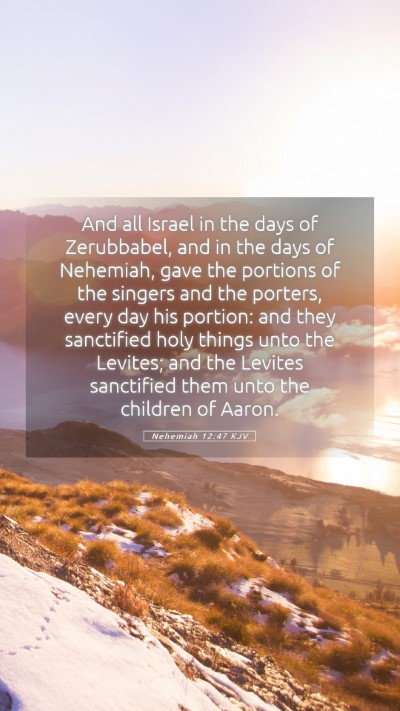Bible Verse Meaning: Nehemiah 12:47
Bible Verse: Nehemiah 12:47 - "And all the days of Zerubbabel and of Nehemiah the governor, and until the day of the sons of Asaph, the singers and their sons, gathered, in the days of Nehemiah, to bring the first fruits and the tithes, and to gather them into the cities of the villages of Judah, that they might be changed into food for the priests and for the Levites; for them that were in the fields...".
Summary of Biblical Exegesis
This verse reflects a pivotal aspect of Jewish life in the post-exilic period, emphasizing the importance of worship and community support. Nehemiah plays a significant role as a leader appointed to restore Jerusalem, and the mention of the singers underlines the integral part of worship in their society. Public Domain Commentators provide valuable insights into the themes present in this Scripture.
Insights from Matthew Henry
Matthew Henry notes that this verse highlights the organized efforts in the restoration of worship practices among the returned exiles. The gathering of first fruits and tithes signifies an act of obedience and devotion to God, where the community recognizes God's provision and seeks to honor Him through their offerings. Henry emphasizes the importance of supporting the priests and Levites, who played crucial roles in ministry.
Insights from Albert Barnes
Albert Barnes expands on the significance of tithing and offerings. He points out that the people’s commitment to bringing their first fruits illustrates a deeper understanding of their covenant relationship with God. The act of gathering these offerings is indicative of communal responsibility towards spiritual leaders, which fosters unity and supports the ministry of worship. Barnes also emphasizes how this practice was a demonstration of faith and reliance on God's continued blessing.
Insights from Adam Clarke
Adam Clarke gives a comprehensive view of the verse, focusing on the sociological aspect of the community's efforts. He indicates that the involvement of the singers and the Levites points to a well-structured religious life where proper worship was central to daily existence. Clarke also notes the historical context in which Nehemiah was leading the people back to Jerusalem, suggesting that the actions taken were not only spiritual but also practical in terms of rebuilding the social fabric of the community.
Key Themes and Concepts
- Restoration of Worship: The organized effort to reinstitute spiritual practices post-exile.
- Community Responsibility: The collective act of bringing offerings signifies communal support for spiritual leaders.
- God’s Provision: Recognition of God's blessings through the practice of giving first fruits and tithes.
- Leadership of Nehemiah: Nehemiah’s role as a governor and spiritual leader who guided the people back to their covenant relationship with God.
Cross References
This verse connects with other Scriptures that emphasize giving, worship, and community support:
- Malachi 3:10: “Bring the whole tithe into the storehouse…” - A call to faithful giving.
- 2 Chronicles 31:5: “As soon as the order went out, the Israelites generously gave...” - Meaning of collective giving in worship.
- Exodus 23:19: “You shall bring the choice first fruits of your soil into the house of the Lord your God...” - Instructions on sacred offerings.
Conclusion
The insights derived from Nehemiah 12:47 offer profound Bible verse meanings relevant for understanding worship, community, and the importance of spiritual leadership. This verse not only provides a snapshot of historical practices but also serves as a guide for contemporary readers to reflect on their own Bible verse interpretations and apply them to their lives.
Further Study Recommendations
For those interested in diving deeper into the meanings of Scripture, consider utilizing Bible study resources and tools that focus on:
- In-depth Bible verse analysis of community worship practices.
- Exploring the significance of Old Testament prophecies through a historical lens.
- Engaging in Bible study groups to discuss and unpack biblical themes.


